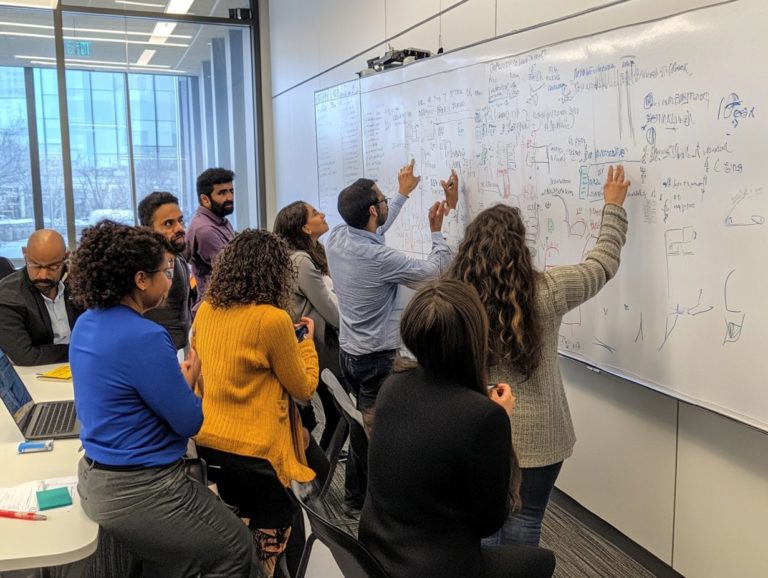the benefits of learning a language in context
Learning a language transcends mere memorization of vocabulary and grammar rules; it flourishes within context.
Grasping the cultural and situational nuances of a language greatly enhances your comprehension and retention. This transforms the learning experience into something profoundly meaningful.
This article delves into the importance of context in language acquisition. It illuminates its benefits, effective strategies, and the challenges you might encounter along the way.
Whether you re embarking on a new language journey or seeking to elevate your existing skills, the insights presented here will empower you to unlock your full learning potential.
Contents
- Key Takeaways:
- The Importance of Learning a Language in Context
- Benefits of Learning a Language in Context
- Methods for Learning a Language in Context
- Challenges of Learning a Language in Context
- Tips for Maximizing the Benefits of Learning a Language in Context
- Frequently Asked Questions
- What is the importance of learning a language in context?
- How does learning a language in context improve language proficiency?
- Can learning a language in context help with cultural understanding?
- What are some practical benefits of learning a language in context?
- Is it better to learn a language in context or through textbooks?
- How can learning a language in context benefit thinking skills?
Key Takeaways:

Learning a language in context, as outlined in the benefits of learning a language in context, improves comprehension and retention. It allows for real-life application and understanding of cultural nuances.
Immersive language programs and utilizing real-life scenarios are effective methods for learning a language in context.
To maximize the benefits of learning a language in context, set realistic goals. Consistently practice and expose yourself to the language.
The Importance of Learning a Language in Context
In today s interconnected world, the significance of learning a language in context cannot be overstated. It boosts your communication skills and helps you understand different cultures better.
When you immerse yourself in contextual language learning especially through esteemed programs like those at Middlebury Language Schools you can markedly enhance your proficiency.
This method is essential for your personal growth don t miss out on it! It opens doors to career opportunities, particularly in fields such as International Relations and government roles.
Here, effective communication is vital for dismantling language barriers and fostering empathetic engagement.
Understanding the Role of Context in Language Learning
Understanding the role of context in language learning is essential. It influences not only your vocabulary acquisition but also how effectively you apply grammatical structures.
This ultimately enhances your overall comprehension. When you engage in authentic situations like ordering food at a restaurant or chatting at a local market you re not merely memorizing phrases; you re internalizing the nuances and cultural references tied to those interactions.
These real-life scenarios give you the opportunity to practice language in a context that closely mirrors its everyday use. This sharpens your cognitive skills in the process.
Immersing yourself in a Spanish-speaking country helps you pick up colloquial expressions and regional dialects that classroom instruction might miss. This experience underscores the importance of cultural context in mastering a second language.
Such interactions not only improve your conversational abilities but also deepen your capacity to empathize and connect with native speakers.
Benefits of Learning a Language in Context
Learning a language in context opens up exciting advantages! It enhances your comprehension and retention, sharpens cognitive abilities, and nurtures a deeper cultural understanding, especially when you explore the benefits of setting language learning challenges.
Improved Comprehension and Retention
One of the primary benefits of immersing yourself in a language within context is the remarkable boost in your comprehension and retention. This improvement stems from the power of context in language learning, as real-life scenarios make learning more engaging and enjoyable.
When you find yourself in situations where the language is actively spoken, you’re far more likely to retain vocabulary and grammatical structures. For example, participating in a cooking class not only helps you pick up food-related vocabulary, but also gives you the opportunity to practice commands and questions in a hands-on environment.
Research from the University of Colorado reveals that students who engage in contextual learning retain up to 75% more information than those who rely solely on traditional methods. Such impressive statistics highlight the effectiveness of creating environments that replicate real-life conversations.
This ultimately enhances both your memory and cognitive skills.
Enhanced Cultural Understanding

Enhanced cultural understanding is a key advantage of learning a language in context, highlighting the importance of contextual learning. It equips you with the skills to engage effectively in our globalized society.
This deeper insight is vital when exploring languages like Arabic, Spanish, and Russian, each rich with cultural histories.
For instance, understanding “inshallah” in Arabic teaches you about faith and patience vital to Arabic-speaking communities.
As you dive into Spanish, discover “sobremesa,” a tradition of enjoying meals together, highlighting the importance of family ties.
In Russian, learn about hospitality (‘ ‘), which reveals a strong cultural value of welcoming others.
By appreciating these cultural nuances, you sharpen your language skills and build meaningful relationships beyond words.
Methods for Learning a Language in Context
Get excited to explore effective methods for learning a language in context!
Immersive language programs and engaging in real-life scenarios significantly enhance your skills and cultural understanding.
Immersive Language Programs
Immersive language programs, like those at Middlebury Language Schools, create environments for rapid proficiency. They blend cultural experiences with language learning.
These programs encourage real-world interactions, allowing you to practice your skills in authentic settings. Engage in cooking classes, community events, and excursions to experience the language in everyday situations.
This hands-on approach enhances your thinking skills and strengthens your understanding of the culture. You ll remember vocabulary and grammar more easily.
As you navigate local customs, your confidence will grow. This transforms your learning into a profoundly rewarding experience.
Utilizing Real-Life Scenarios
Utilizing real-life scenarios boosts your language learning. Practice your skills in authentic situations to enhance communication and cultural understanding.
Engage in role-playing or practical conversations, like ordering food at a restaurant or using public transportation.
Mimicking interactions with shopkeepers helps you learn vocabulary and social norms of such exchanges.
This immersive practice builds your confidence and sharpens your interpersonal skills. You ll articulate your thoughts clearly and build rapport in diverse settings.
Challenges of Learning a Language in Context
While learning a language in context offers many advantages, it presents challenges too.
Be prepared to navigate language barriers and diverse cultural norms that can complicate communication.
Overcoming Language Barriers

Overcoming language barriers is crucial for effective communication in our multilingual world. It demands a strategic approach to language learning that enhances your thinking skills and adaptability.
In this intricate landscape, you ll discover amazing benefits from immersing yourself in the language. Engaging with native speakers and consuming media in your target language will naturally boost your comprehension and speaking abilities.
Utilizing tools like language apps or online platforms can streamline your practice and reinforce vocabulary retention. Embrace your mistakes as valuable learning experiences; doing so promotes resilience and fosters personal growth.
Developing strong listening skills not only aids your understanding but also cultivates a deeper understanding of cultural differences, ultimately transforming how you interact in diverse environments.
Adapting to Different Cultural Norms
Adapting to different cultural norms is an essential part of learning a language in context. It directly influences how effectively you communicate and fosters a deeper empathy with others.
When you immerse yourself in the customs, traditions, and social etiquette of a particular culture, you unlock a richer understanding of the language itself. Recognizing the importance of non-verbal cues like gestures and facial expressions can significantly enhance your interactions and help you avoid misunderstandings.
By appreciating cultural references, such as idioms and humor, you can engage in conversations that resonate more deeply with native speakers. This understanding of cultural differences sharpens your linguistic skills and enables you to build meaningful connections, sharing experiences and perspectives across diverse backgrounds.
Ultimately, this enriches both your personal and professional life in ways you might not have imagined.
Tips for Maximizing the Benefits of Learning a Language in Context
To truly maximize the benefits of learning a language in context, you should implement effective strategies. Start by setting realistic goals that align with your ambitions and maintain consistent practice to elevate your skills. This approach ensures that your learning journey is both rewarding and sustainable.
Setting Realistic Goals
Setting realistic goals is crucial for your success in language learning. It helps you grow and enables you to track improvements in your thinking skills over time. This strategy keeps your motivation high and aids in managing the learning process with finesse.
For instance, break down the grand goal of achieving fluency into smaller, attainable targets like mastering a specific number of vocabulary words each week or participating in brief conversations. You create a tangible sense of accomplishment.
Utilizing the SMART criteria Specific, Measurable, Achievable, Relevant, and Time-based can further refine these goals. Embracing such techniques ensures that you can celebrate your incremental progress, transforming the journey into not just a productive endeavor but a truly enjoyable one.
Consistent Practice and Exposure
Consistent practice and exposure are essential elements in your language learning journey. They reinforce memory retention and enhance your overall skills in a meaningful context. By establishing a routine that seamlessly blends both, you can significantly accelerate your progress and deepen your understanding.
Immerse yourself in the language daily whether through reading books, listening to podcasts, or engaging in conversations with native speakers. Every bit counts. Setting specific goals, like dedicating a set amount of time each day to vocabulary practice or tackling weekly conversation challenges, can keep your motivation high.
You can use language learning apps, join local language exchange groups, or watch films in your target language to create natural exposure. By integrating these strategies into your daily life, you ll find that language acquisition becomes not just intuitive but genuinely enjoyable.
Frequently Asked Questions

What is the importance of learning a language in context?
Learning a language in context helps you understand the cultural and social aspects, highlighting the importance of context in language immersion. This makes it more meaningful and practical for real-life use.
How does learning a language in context improve language proficiency?
Learning in context exposes you to natural language use, highlighting the importance of cultural context in language teaching. This approach develops your speaking, listening, reading, and writing skills at the same time.
Can learning a language in context help with cultural understanding?
Yes! Learning a language in context deepens your understanding of the culture, customs, and beliefs of its speakers. This knowledge allows you to communicate more effectively and respectfully.
What are some practical benefits of learning a language in context?
Learning a language in context boosts your job prospects. Employers often seek bilingual employees, which can also enhance your travel experiences.
Is it better to learn a language in context or through textbooks?
Textbooks provide a good foundation, but learning in context offers practical understanding. Combining both methods creates a well-rounded learning experience.
How can learning a language in context benefit thinking skills?
Research shows that learning a language in context improves memory, problem-solving, and critical thinking. It also enhances the brain’s ability to adapt, helping to prevent cognitive decline as we age.






